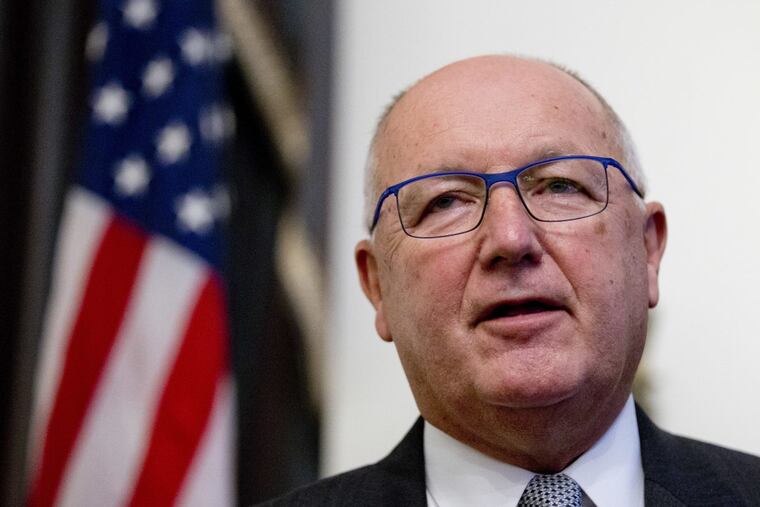Trump's new ambassador ignored questions from Dutch reporters. Now, US reporters want answers.
The State Department distanced itself from envoy's anti-Muslim remarks, saying "the Ambassador made mistakes."

WASHINGTON – The State Department distanced itself on Wednesday from the baseless anti-Muslim theory spread by its ambassador to the Netherlands a few years ago, but declined to call the remarks inaccurate.
During a news conference at the State Department's headquarters in Washington, Undersecretary Steve Goldstein told reporters that Pete Hoekstra, the new U.S. ambassador in the Netherlands, had "made comments that should not have been made" when asked about Hoekstra's statements about Muslim no-go zones and people being burned alive because of the Islamic movement.
"The Ambassador made mistakes in 2015," said Goldstein, who like Hoekstra, is a political appointee. "Those comments were not the position of the State Department and you will never hear those words from this podium."
Still Goldstein refused to label Hoesktra's comments inaccurate despite being pressed by reporters at the briefing.
In 2015, Hoekstra spoke at a conference hosted by a right-wing anti-terrorism group, claiming without evidence that the "Islamic movement" had brought chaos to the Netherlands.
"There are cars being burned. There are politicians that are being burned," he said. "And yes, there are no-go zones in the Netherlands."
The remarks, which play off an unsupported theory that is popular in right-wing media, have been the subject of multiple inquiries by Dutch reporters, who asked Hoesktra repeatedly to provide evidence for them or retract the remarks during a tense first meeting with him on Wednesday. Hoesktra has declined to substantiate the remarks, and did not clarify an apology he gave in December after making false statements to a reporter who had asked about them.
During the exchange on Wednesday, which was captured on video, the ambassador fell silent as a series of reporters continued to query him, drawing a slew of critical headlines in the Netherlands and coverage across the world.
On Thursday, reporters questioned Goldstein about the appropriateness of Hoekstra's ambassadorship in light of his performance at the news conference and additional statements beyond the 2015 conference where he appeared to spread anti-Muslim conspiracy theories.
"He's been received well by the Dutch government, and we hope that he can be received well by the people of the Netherlands," Goldstein said. "I have advised, as I've advised most people, that when reporters are in front of you, just as you are in front of me, that it's always good to answer question."
Hoekstra, a former Republican congressman from Michigan, talked about "no-go zones" on several occasions; he has referred to their presence in European cities multiple times in conservative media before he became the ambassador.
He speculated that some 10 to 15 percent of the Muslim community in the world – what would amount to as many as 270 million people – were radical Islamist militants and appeared to imply that former Hillary Clinton aide Huma Abedin had "egregious" ties to the Muslim Brotherhood, a recent conspiracy theory that The Washington Post and other publications have determined to be baseless. Those comments were first unearthed by CNN reporter Andrew Kaczynski.
The theory of lawless Muslim "no-go zones" run by sharia courts and forbidden to police and outsiders in Europe has been fanned on right-wing media, and found prominence on Fox News shows hosted by Jeanine Pirro and Sean Hannity in recent years, despite a lack of evidence.
The network has run multiple segments where hosts or guests mentioned the issue.
In January 2015, Fox News anchor Julie Banderas issued an apology and a correction after a guest talked at length on Pirro's show about the presence of such zones, admitting that "there is no formal designation of these zones," and saying that the segment had aired "regrettable errors" about Europe's Muslim population.
But Fox News continues to run segments where the so-called phenomenon is mentioned; a search on the TV News Archive turned up more than 140 examples since the beginning of 2015.
The pundit on Pirro's show who made the discredited remarks, Steve Emerson, runs a nonprofit called the Investigative Project on Terrorism where Hoekstra served as a fellow, a fact celebrated on his official State Department biography.
Goldstein was asked whether he believed there were any no-go zones in Europe.
"I'll get back to you on that question," he said. "That's not the language we would use."
The State Department recently released its updated travel advisories; Netherlands was listed at the lowest level of security threat. Though it noted a risk of terrorism plots, it said the biggest threat related to the 90,000 refugees the country took in 2015 and 2016 was "societal animosity and discrimination against certain ethnic/religious minority groups, particularly Muslim immigrants from North Africa, Turkey, and the Middle East."
Goldstein said that Hoekstra has an interview scheduled with a Dutch media outlet on Friday, but he didn't name the organization.
"And he also plans over the weekend to be available within many of the communities in the capital, including Muslim communities," he said. "The Department has had conversations with the Ambassador. The Ambassador wants to get this behind him."